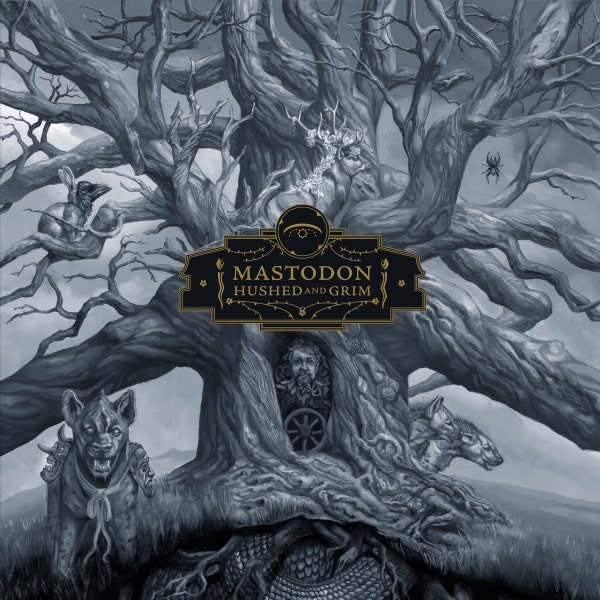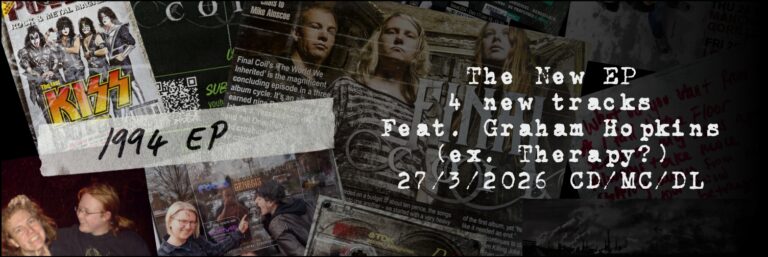It’s not always easy being a Mastodon fan. At their best, the band are capable of carving out vast sonic cathedrals that appear to float in time and space (see: Crack the Skye). However, they are not necessarily consistent, with albums like Once More Around the Sun lacking the flair of earlier outings. Given the band’s increasingly progressive leanings, it’s something of a surprise that Hushed and Grim is the band’s first double effort. The good news, however, is that, with the additional space on offer, the band have stretched their wings in a number of surprising ways, still maintaining a good deal of their neurosis-inspired weight at one end of the spectrum, adopting an airy Pink Floyd sound at the other. The result is easily the band’s best work since Crack the Skye, and it shows the band’s capabilities in the best possible light.
Right from the start, Hushed and Grim sounds very different to all that has gone before, with opening track Pain with An Anchor initially sounding more like Opeth than Mastodon. Not that this is an exercise in plagiarism. Mastodon, with their multiple vocalists, soon step away from the heavily harmonised verse to deliver a bridge that’s more typically mastodon in style, but it’s certainly a different, airier take on Mastodon’s oeuvre and it works spectacularly well as an ambitious opener. In one sense The Crux appears to be typical Mastodon, not dissimilar from tracks found on Emperor of Sand, but appearances can be deceiving, and the band abruptly plunge the listener into a progressive second half that sits somewhere between Wall-era Floyd and Queensryche. It’s a bold move and the band execute the sonic shifts with deft grace. Opening with eerie voices, Sickle and Peace is one of the band’s most progressive outings to date, all hushed vocals and hypnotic percussion, although things take a heavier turn as the track slowly wends its way forward. The quasi-orchestral sounds of the Mellotron lead us into the punishing More Than I Could Chew, a track that pitches airy, heavily delayed vocals against a rock-solid foundation of palm muted guitars that threaten to overwhelm with their sheer, persistent force.
A very different sound emerges on the countrified The Beast. Reflective and unexpected, it is quite unlike anything the band have attempted before, and it allows a touch of light after the relentless surge of its predecessor. The band keep things calm with the haunting beauty of Skeleton of Splendor; a melancholic piece reminiscent of Katatonia that perfectly suits the album’s musical progressions. As the track progresses, the band take a further left turn, ending up in Meddle-era Pink Floyd, offering up some of the best lead work yet heard on a Mastodon album. Heavier guitars return on Teardrinker, although the pace remains calm, once again nudging into Katatonia territory, with a touch of Muse thrown in for good measure. It leaves the staccato Pushing the Tides to see out the first disc in a scything display of metallic firepower that sweeps away the more progressive fare that sits at the heart of the disc in a welter of blistering riffs.
Opening disc two, Mastodon immediately step up the pace with the dizzying riffs of the misleadingly titled Peace and Tranquillity. Following its multi-tiered opening, the track settles down into something a tad calmer, but it is, nonetheless, a vital track with some truly remarkable playing and an insanely catchy melody. An ominous chord announces the arrival of the stair-stepping Dagger, a truly remarkable piece of work, which mixes elements of Middle Eastern music, Iron Maiden and industrial into one of the most compelling pieces of music the band have ever penned. Next up, the gentle Had It All arrives on a gentle tide of tribal percussion and clean guitar. It’s a truly lovely piece of music that is neatly juxtaposed with the ferocious Savage Lands, another track that delights in wrongfooting the listener just as you think you have it all figured out.
Opening the album’s final chapter, Gobblers of Dregs floats on a bed of phased guitar and rhythmic noise before expanding into a midtempo track with a doomy underpinning. However, the track does little to prepare you for the Pumpkins-esque grandeur of Eyes of Serpents. Built over a syncopated rhythm and with clean guitars once more to the fore, Eyes of Serpents is another genuinely lovely piece of music that, over the course of its runtime, expands to include references to Iron Maiden and Led Zeppelin. It’s a truly epic piece of music and yet it never feels overcooked in its delivery. The band finally conclude it all with Gigantium, another piece that taps into that sense of Corgan-esque wonder, filtered through Mastodon’s own unique lens. A deeply melodic piece, despite the massed ranks of flaming guitars that drive it forward, it serves as a fitting climax to an album that has far too much to absorb in a single sitting.
Mastodon have undergone many changes over the course of their career, but none so titanic as the evolution that has occurred here. In conceiving a double album, it feels like the band finally have the space to explore their increasingly progressive ambitions, and the result is a set that flows beautifully, ensuring that the eighty-minute runtime barely registers. While those who yearn for the blistering days of Blood Mountain may lament the measured pace that predominates, the approach here feels natural, while the musicianship is so ubiquitously excellent that you can only gasp in awe at points throughout the record. Far too much to absorb in one go, this is one of those albums that fans will be digesting and debating years down the line and it’s an easy contender for album of the year. 9.5/10




